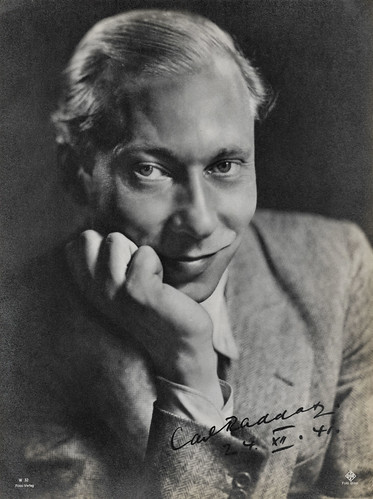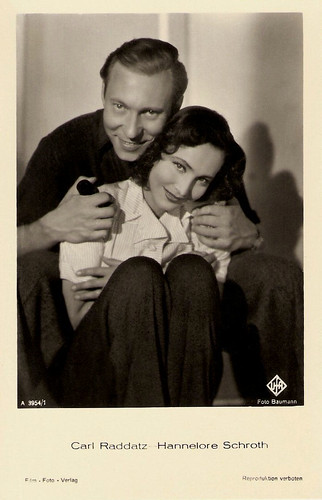German actor Carl Raddatz (1912-2004) was much in demand by film producers in the 1940s and especially in the 1950s. He appeared in several Nazi Propaganda films, and he also gave Joseph Stalin a German voice. Through the years he would become one of the leading character actors of the German theatre.

Big German card by Film-Foto-Verlag, no. G 199, 1941-1944. Photo: Baumann.

Big German card by Ross Verlag, no. W 32, 1941-1944. Photo: Binz / Ufa. Signed on 24 XII 1941.

Big German card by Film-Foto-Verlag, no. W 63, 1941-1944. Photo: Quick / Ufa. Signed on 24 December 1942.

Big German card by Film-Foto-Verlag, no. W 85, 1941-1944. Photo: Baumann.
Carl Raddatz was born as Karl Werner Fitz in Mannheim, Germany in 1912. His parents were insurance agent Karl Hermann Raddatz and Luisa Elisabetha Nußbickel.
He took acting lessons from Willy Birgel, who engaged him for the Mannheimer Nationaltheater. Engagements in Aachen, Darmstadt, Bremen and finally Berlin followed.
In Berlin he would have his greatest successes. In the Ufa studios in Babelsberg, he made his film debut in the Propaganda film Urlaub auf Ehrenwort/Furlough on Word of Honor (Karl Ritter, 1938). Soon followed more Ufa productions like Liebelei und Liebe/Flirtation and Love (Arthur Maria Rabenalt, 1938) with Paul Hörbiger as well as Verklungene Melodie/Dead Melody (Viktor Tourjansky, 1938) with Brigitte Horney.
In the next years, Raddatz became established as a star and appeared in well-known productions like Befreite Hände/Freed Hands (Hans Schweikart, 1939) opposite Olga Tschechova, Zwielicht/Twilight (Rudolph von der Noss, 1940) with Viktor Staal, Der 5. Juni/June the 5th (Fritz Kirchhoff, 1942), opposite Kristina Söderbaum in Immensee (Veit Harlan, 1943), and Opfergang/The Great Sacrifice (Veit Harlan, 1944).
He also starred in the poetic love-triangle Unter den Brücken/Under the Bridges (Helmut Käutner, 1945) with Hannelore Schroth and Gustav Knuth. Of his own films, director Helmut Käutner who was one of the major figures of post-War German cinema, considered this to be his best work.
He also played in Nazi Propaganda films like Wunschkonzert/Request Concert (Eduard von Borsody, 1940), Stukas (Karl Ritter, 1941), and Heimkehr/Homecoming (Gustav Ucicky, 1941), a justification of the German invasion of Poland.

German postcard by Film-Foto-Verlag, no. A 3579/2, 1941-1944. Photo: Baumann / Ufa.

German postcard by Film-Foto-Verlag, no. A 3855/1, 1941-1944. Photo: Baumann / Ufa.

German postcard by Film-Foto-Verlag, no. A 3954/1, 1941-1944. Photo: Baumann / Ufa. Carl Raddatz and Hannelore Schroth.
After the war, Carl Raddatz rather smoothly continued his career with films like the episode film In jenen Tagen/In Those Days (Helmut Käutner, 1946-1947), and Epilog/Epilogue (Helmut Käutner, 1950).
Next to these films, he worked mainly in the theatre. In the mid-1950s, he became a darling of the public with the films Rosen im Herbst/Roses in Autumn (Rudolf Jugert, 1955) with Ruth Leuwerik, Nacht der Entscheidung/Night of Decision (Falk Harnack, 1956) with Hilde Krahl, and Made in Germany (Wolfgang Schleiff, 1957) with Winnie Markus.
He also starred in the musical drama Gabriela (Géza von Cziffra, 1950) opposite Zarah Leander. It was Leander's comeback film after a seven-year absence from filmmaking and became the third highest-grossing film at the West German box office in 1950.
Other popular films were the dramas Regina Amstetten (Kurt Neumann, 1953) also starring Luise Ullrich, and Carl Esmond, and Das Mädchen Rosemarie/Rosemary (Rolf Thiele, 1958) with Nadja Tiller. The film portrays the scandal that surrounded the prostitute Rosemarie Nitribitt.
Giulietta Masina was his partner in the German-Italian co-production Jons und Erdme/La donna dell'altro/Jons and Erdma (Victor Vicas, 1959). It was an adaptation of Hermann Sudermann's story 'Jons and Erdma' from the collection 'The Excursion to Tilsit', about the troubled relationship between the strong-willed Erdma and her irascible husband Jons in the Lithuanian moors.

German postcard by Film-Foto-Verlag, no. 158. Photo: Foto Quick / Ufa.

German postcard by Film-Foto-Verlag, no. A 3484/1, 1941-1944. Photo: Wien-Film / Ufa.

German collectors card in the "Deutsche Film-Lieblinge", series I.
Carl Raddatz's film career ended slowly with The Counterfeit Traitor (George Seaton, 1962) starring William Holden, and finally, the Hans Fallada adaptation Jeder stirbt für sich allein/Everyone Dies Alone (Alfred Vohrer, 1975) with Hildegard Knef.
For TV, he appeared opposite Ruth Leuwerik in the series Die Buddenbrooks/The Buddenbrooks (1979) based on the classic novel by Thomas Mann, and in an episode of the popular crime series Derrick (1990).
He always remained true to the theatre. For years, he was a member of the ensemble of the Staatlichen Schauspielbühnen Berlin and played many interesting roles that heaved him to the guild of leading character actors.
In the 1950s, he had also dubbed stars like Humphrey Bogart, Robert Taylor, and Lee Marvin, and after WW II, he gave Joseph Stalin his voice on German TV. In 1972, he was awarded the Bundesverdienstkreuz (Order of Merit of the Federal Republic of Germany) and in 1979 the Filmband in Gold (German Film Award).
Carl Raddatz died in 2004 in Berlin. He was 92. Raddatz was married three times. His first wife was actress Hannelore Schroth, his partner in Unter den Brücken/Under the Bridges (1945).

German postcard by Kunst und Bild, no. A 1189. Photo: T. v. Mindszenty / Deutsche London (TLF). Carl Raddatz in Geständnis unter vier Augen/Confession Under Four Eyes (André Michel, 1954).

German postcard by Rüdel-Verlag, Hamburg-Bergedorf, no. 1923. Photo: Corona / Deutsche London (TLF) / Lilo. Carl Raddatz in Made in Germany (Wolfgang Schleif, 1957).
'Einmal wirst du wieder bei mir sein sein' (Once You Will Be With Me Again) performed by Carl Raddatz in Wir tanzen um die Welt/We Dance Around the World (Karl Anton, 1939). Source: Various Artists - Topic (YouTube).
Sources: Hans-Michael Bock (Filmportal.de - German), Thomas Staedeli (Cyranos), Wikipedia (German), and IMDb.

Big German card by Film-Foto-Verlag, no. G 199, 1941-1944. Photo: Baumann.

Big German card by Ross Verlag, no. W 32, 1941-1944. Photo: Binz / Ufa. Signed on 24 XII 1941.

Big German card by Film-Foto-Verlag, no. W 63, 1941-1944. Photo: Quick / Ufa. Signed on 24 December 1942.

Big German card by Film-Foto-Verlag, no. W 85, 1941-1944. Photo: Baumann.
Nazi Propaganda films
Carl Raddatz was born as Karl Werner Fitz in Mannheim, Germany in 1912. His parents were insurance agent Karl Hermann Raddatz and Luisa Elisabetha Nußbickel.
He took acting lessons from Willy Birgel, who engaged him for the Mannheimer Nationaltheater. Engagements in Aachen, Darmstadt, Bremen and finally Berlin followed.
In Berlin he would have his greatest successes. In the Ufa studios in Babelsberg, he made his film debut in the Propaganda film Urlaub auf Ehrenwort/Furlough on Word of Honor (Karl Ritter, 1938). Soon followed more Ufa productions like Liebelei und Liebe/Flirtation and Love (Arthur Maria Rabenalt, 1938) with Paul Hörbiger as well as Verklungene Melodie/Dead Melody (Viktor Tourjansky, 1938) with Brigitte Horney.
In the next years, Raddatz became established as a star and appeared in well-known productions like Befreite Hände/Freed Hands (Hans Schweikart, 1939) opposite Olga Tschechova, Zwielicht/Twilight (Rudolph von der Noss, 1940) with Viktor Staal, Der 5. Juni/June the 5th (Fritz Kirchhoff, 1942), opposite Kristina Söderbaum in Immensee (Veit Harlan, 1943), and Opfergang/The Great Sacrifice (Veit Harlan, 1944).
He also starred in the poetic love-triangle Unter den Brücken/Under the Bridges (Helmut Käutner, 1945) with Hannelore Schroth and Gustav Knuth. Of his own films, director Helmut Käutner who was one of the major figures of post-War German cinema, considered this to be his best work.
He also played in Nazi Propaganda films like Wunschkonzert/Request Concert (Eduard von Borsody, 1940), Stukas (Karl Ritter, 1941), and Heimkehr/Homecoming (Gustav Ucicky, 1941), a justification of the German invasion of Poland.

German postcard by Film-Foto-Verlag, no. A 3579/2, 1941-1944. Photo: Baumann / Ufa.

German postcard by Film-Foto-Verlag, no. A 3855/1, 1941-1944. Photo: Baumann / Ufa.

German postcard by Film-Foto-Verlag, no. A 3954/1, 1941-1944. Photo: Baumann / Ufa. Carl Raddatz and Hannelore Schroth.
A darling of the public
After the war, Carl Raddatz rather smoothly continued his career with films like the episode film In jenen Tagen/In Those Days (Helmut Käutner, 1946-1947), and Epilog/Epilogue (Helmut Käutner, 1950).
Next to these films, he worked mainly in the theatre. In the mid-1950s, he became a darling of the public with the films Rosen im Herbst/Roses in Autumn (Rudolf Jugert, 1955) with Ruth Leuwerik, Nacht der Entscheidung/Night of Decision (Falk Harnack, 1956) with Hilde Krahl, and Made in Germany (Wolfgang Schleiff, 1957) with Winnie Markus.
He also starred in the musical drama Gabriela (Géza von Cziffra, 1950) opposite Zarah Leander. It was Leander's comeback film after a seven-year absence from filmmaking and became the third highest-grossing film at the West German box office in 1950.
Other popular films were the dramas Regina Amstetten (Kurt Neumann, 1953) also starring Luise Ullrich, and Carl Esmond, and Das Mädchen Rosemarie/Rosemary (Rolf Thiele, 1958) with Nadja Tiller. The film portrays the scandal that surrounded the prostitute Rosemarie Nitribitt.
Giulietta Masina was his partner in the German-Italian co-production Jons und Erdme/La donna dell'altro/Jons and Erdma (Victor Vicas, 1959). It was an adaptation of Hermann Sudermann's story 'Jons and Erdma' from the collection 'The Excursion to Tilsit', about the troubled relationship between the strong-willed Erdma and her irascible husband Jons in the Lithuanian moors.

German postcard by Film-Foto-Verlag, no. 158. Photo: Foto Quick / Ufa.

German postcard by Film-Foto-Verlag, no. A 3484/1, 1941-1944. Photo: Wien-Film / Ufa.

German collectors card in the "Deutsche Film-Lieblinge", series I.
Guild of Leading Character Actors
Carl Raddatz's film career ended slowly with The Counterfeit Traitor (George Seaton, 1962) starring William Holden, and finally, the Hans Fallada adaptation Jeder stirbt für sich allein/Everyone Dies Alone (Alfred Vohrer, 1975) with Hildegard Knef.
For TV, he appeared opposite Ruth Leuwerik in the series Die Buddenbrooks/The Buddenbrooks (1979) based on the classic novel by Thomas Mann, and in an episode of the popular crime series Derrick (1990).
He always remained true to the theatre. For years, he was a member of the ensemble of the Staatlichen Schauspielbühnen Berlin and played many interesting roles that heaved him to the guild of leading character actors.
In the 1950s, he had also dubbed stars like Humphrey Bogart, Robert Taylor, and Lee Marvin, and after WW II, he gave Joseph Stalin his voice on German TV. In 1972, he was awarded the Bundesverdienstkreuz (Order of Merit of the Federal Republic of Germany) and in 1979 the Filmband in Gold (German Film Award).
Carl Raddatz died in 2004 in Berlin. He was 92. Raddatz was married three times. His first wife was actress Hannelore Schroth, his partner in Unter den Brücken/Under the Bridges (1945).

German postcard by Kunst und Bild, no. A 1189. Photo: T. v. Mindszenty / Deutsche London (TLF). Carl Raddatz in Geständnis unter vier Augen/Confession Under Four Eyes (André Michel, 1954).

German postcard by Rüdel-Verlag, Hamburg-Bergedorf, no. 1923. Photo: Corona / Deutsche London (TLF) / Lilo. Carl Raddatz in Made in Germany (Wolfgang Schleif, 1957).
'Einmal wirst du wieder bei mir sein sein' (Once You Will Be With Me Again) performed by Carl Raddatz in Wir tanzen um die Welt/We Dance Around the World (Karl Anton, 1939). Source: Various Artists - Topic (YouTube).
Sources: Hans-Michael Bock (Filmportal.de - German), Thomas Staedeli (Cyranos), Wikipedia (German), and IMDb.
No comments:
Post a Comment